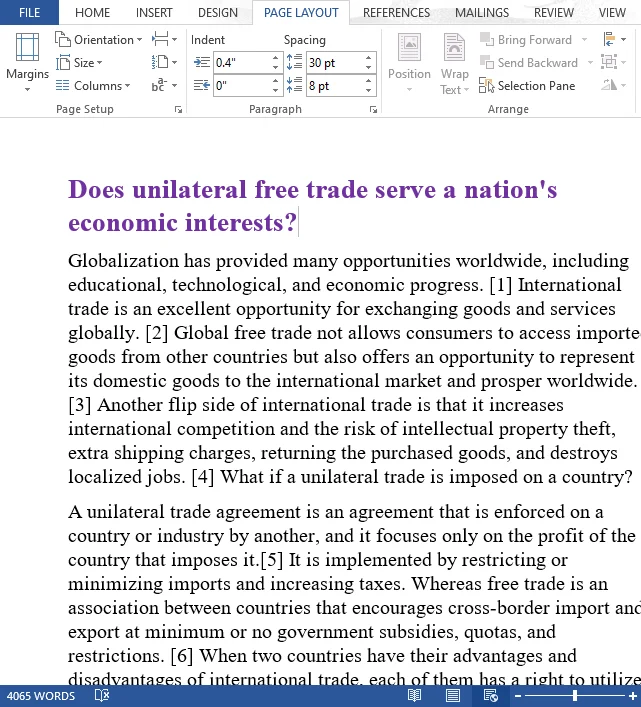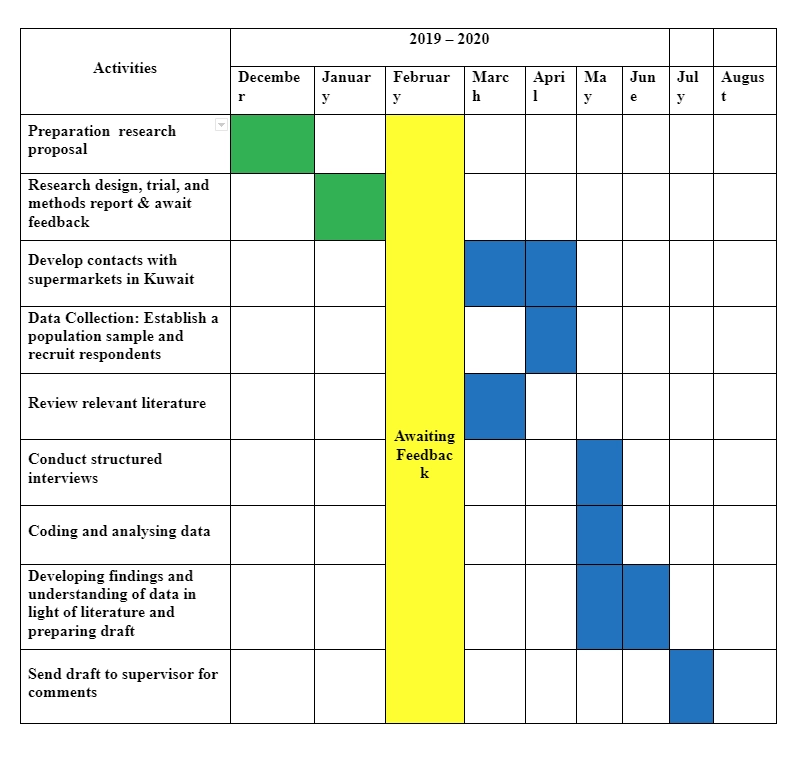Sample Masters Retailers Dissertation Proposal
Here is a sample that showcases why we are one of the world’s leading academic writing firms. This assignment was created by one of our UK dissertation proposal writers and demonstrated the highest academic quality. Place your order today to achieve academic greatness.
Analysing the Impact of Outsourcing on Customer Experience of Supermarkets in Kuwait
Introduction
Background
Today’s modern business environments have placed increased pressure on manufacturers and retailers to satisfy customer requirements of product quality improvement, demand responsiveness, and product customisation. To sustain such a dynamic environment, businesses continue to strive for long-term strategic partnerships with suppliers to collaborate for product development, inventory control and outsourcing of non-core business processes (Chan et al., 2003).
Due to the highlighted competitive business environment; an effect of changing information technology, businesses are forced to implement various innovative management programmes and techniques that allow them to compete in a dynamic marketplace (Nyaoga et al., 2013).
Due to this constant competition to satisfy the customer, businesses have become highly flexible and innovative within the modus operand, competitive advantages for a business allow it to have a special edge that makes it capable to deal with dynamic markets and environmental forces than its non-competitive counterparts (Lyson and Farrington, 2006).
This concentrated competition and saturation in markets are even forcing supermarkets to access new revenue streams globally. According to Agnese (2003) and Blisard et al., (2002) supermarkets are expanding their assortment of products through services and increasing focus on consumer loyalty programmes.
These new strategies give way to challenges in logistic operations; Kumar (2007) found that major supermarket chains such as Tesco and Sainsbury in Europe, Fleming, Kroger, Supervalu and Safeway in the United States, and Jusco in Japan are seeking methods for increased efficiencies using improved technology for areas of logistics to increase their growth and improve the supermarket industry. Kumar (2007) notes that many of these companies have sought to outsource many of their non-core processes such as logistics and warehousing.
Outsourcing is a process that is not limited to common purchasing and consulting contracts because it involved more than just shifting non-core activities within a business, it also includes shifting resources that make those activities possible. Resources include people, equipment, technology, and infrastructure.
In terms of the process, outsourcing can include an entire function or some element of activity being shifted out, with the remainder of activities staying in-house. Businesses first identify a specific function that may have the potential for outsourcing; then break the function down into its components to determine which activities are critical and should remain in-house, while others can be outsourced.
Outsourcing may be a process used to gain a competitive advantage with it being adopted with great popularity (Nyaoga et al., 2013). Many businesses are now increasingly looking towards outside firms to perform activities that were once completed in-house to obtain an advantage of the process, cost, or time.
Kuwait’s supermarket boom occurred during the 1990s before which Kuwait only had one type of food retailer from the 1960s to the early 1990s – Co-Operative Society, a government-owned retailed that was conveniently located in each section of large neighbourhoods in Kuwait (Alhemoud, 2008).
The food retailing industry has undergone major changes since the First Gulf War (Alhemoud, 2008). The growth of private supermarkets and the increasing need for products not available in government-owned Co-Operative markets have opened the food retailed market in Kuwait. The first entrants to the food retail industry in the country were privately-owned Western-style supermarket chains. Many of these chains were located further from residential areas, with many of these modern supermarkets managing to differentiate themselves from government-owned Co-Ops (Alhemoud, 2008).
This study looks to explore the impact that outsourcing of non-core business activities such as lead-time and customer service of private supermarkets in Kuwait have on customers’ experience. The aims and objectives of the proposed research are further defined in the following sections.
Research Problem
Jacobs (2009) finds that the act of outsourcing is logical for businesses that may lack the needed economies of scale, technology, or skill to conduct the required function effectively and efficiently. However, Stevenson (2007) argues that there are significant risks associated with outsourcing, such as manufactured goods having the risk of high shipping costs and long lead times caused by long transportation distances, and time needed to pass through security checkpoints at borders; these risks impact negatively on the quality of services provided to customers.
Keeping in view the risk associated with outsourcing it is imperative to the impact that factors such as outsourcing lead-time and customer service may have on supermarkets in Kuwait. Some of the most critical strategic priorities of supermarkets and hypermarket chains are customer experience management and cost control & business efficiency (Malagueno et al., 2019; Feroj, 2018).
Not only are these priorities for supermarket and hypermarket chains but they are also challenging that they need to overcome to maximise their ability to capture the market. Many supermarkets and hypermarkets throughout the world have begun to delegate activities like lead-time and customer service to third-party companies for business process outsourcing which includes accounting, human resources, customer relations, and payroll (Agboola, 2019; Andrews, 2019; Karonjo, et al., 2019; Kosgey and Njuguna, 2019).
Thus, it becomes critical to comprehend how the implementation of such processes as being outsourced will affect the customer experience of shoppers.
Research Aims & Objectives
The primary aim of the proposed study is to analyse the impact of outsourcing activities such as lead-time and customer service on customer experience in supermarkets/hypermarkets in Kuwait.
The primary aim of the proposed study supplements some of the developed research questions:
- Does outsourcing non-core business activities negatively impact customer experience?
- Does outsourcing lead-time competencies decrease its operation and internal processes efficiency?
- Does outsourcing customer service competencies reduce service quality?
- Do outsourcing lead-time and customer service competencies negatively affect customer experience?
The following are the objectives of the proposed study:
- Identify processes and activities that are commonly outsourced to third-party firms in Kuwait’s supermarkets and hypermarkets.
- Examine the company’s methodology of identifying and delegating activities that need to be outsourced.
- Examine the impact of outsourcing on customer experience in terms of the shopping experience of the supermarket/hypermarkets online and offline.
Research Significance
The proposed study can contribute significantly to the body of knowledge currently present for business outsourcing, customer experience, and customer satisfaction. Not only with the study of academic significance, but its findings can also be practically implemented in businesses not limited to supermarkets and hypermarkets. The study will practically help business managers minimise costs through effective outsourcing while also creating value for money. The research is also significant as it contributes applicable knowledge to organisations for them to better understand situations in which outsourcing is beneficial.
Receive feedback on language, structure and layout
Professional editors proofread and edit your paper by focusing on:
- Academic style
- Vague sentences
- Grammar
- Style consistency

Literature Review
Introduction
The proposed study will use concepts of systematic literature review to ensure that relevant and up-to-date literature is included in the literature review. The proposed literature review will ensure that academic research papers are analysed including journals, peer-reviewed publications, and concentrated books related to the topic of the proposed study. The literature will be analysed, discussed, and organised using concepts of thematic analysis.
Outsourcing Process
Several models have been developed to explain the concept of outsourcing. In a study published by Deloitte and Touche (2002) a model was designed for mid0sized organisations to utilise strategic outsourcing solutions that large enterprises use. Bendor-Samuel (1999) proposed a model that emphasised the need for leveraging a provider’s economies of scale in outsourcing.
Both these models focus on common characteristics that are critical for outsourcing processes. Detailed analysis of both models shows that five stages produce fair outsourcing deals between companies. Both models begin with an investigation stage where current processes and systems are examined and compared.
During this stage, any opportunities for improvement are recognised to determine if there are any potential advantages or disadvantages to outsourcing. This method provides decision-makers with baseline costs and service levels. The next stage in the process includes tendering, in which decision-makers gain knowledge from benchmarking to set adequate performance targets.
The process aids in identifying serious contenders for the business and outlines expected performance in addition to measurement variables of performance. The next level of the models introduced the negotiation stage which is reinforced using external validation of the business’s requirements. The next two stages include the implementation stage and lastly, relationship management.
Cause of Outsourcing
According to a 1998 study conducted by The Outsourcing Institute (1998) services most likely to be outsourced are those that are resource-intensive and required special skills. Academics such as Lyson and Farrington (2006) have found that most outsourced services are those that need the most resources, discrete, or characterised as having shifting work patterns with regards to throughput and loading, or those that are most likely to be subjected to shifting markets. Some of the most outsourced servers in Kuwait are information systems and information technology-based services within the healthcare sector (Khalfan and Alshawaf, 2003).
Issues of Outsourcing
According to Bozarth (2008) outsourcing has its share of issues that are different from conducting the tasks in-house. One of the biggest risks pointed out by Bozarth (2008) is misstating information such as their abilities, process technologies, or performance that is not up-to-par with the expectations of customers.
There are also issues of suppliers’ inability to produce the product for a single buyer. Businesses who are deciding to outsource risk losing critical skills and technology that may be included in their core competencies. The only way to overcome such issues, companies often supervise the design, operations and supply chain processes, while also keeping up to date on what customers want and if these demands are being met.
Other issues related to outsourcing include coordination and control. Therefore, firms that are looking to outsource may need to develop safeguards to regulate the confidentiality, performance, and quality of the outsourced goods or services. Bendor-Samuel (1999) found that coordinating the movement of materials across businesses can be a critical challenge. This becomes even more difficult when both firms face differences in time zones, information systems, and language barriers.
Bendor-Samuel (1999) also notes that outsourcing supplying firms often give rise to issues when they ignore the unique needs of customers, the importance of leverage, and escaping accountability. Furthermore, issues may arise when outsourcing firms rely greatly on executive decision-makers, allowing an outsourced company to lead the processing of projects, and problem resolution, and interfering with the outsourcing process. There are also risks with signing a contract with both companies that may be too long term, including inappropriate governance and lacking accountability.
Customer Service Management
Khong and Richard (2003) describe customer service management as the ability of the organisation to manage its customer services about effectiveness, productivity, and quality. Kong and Richard (2003) believe that effective customer service management can result in customer retention, and customer satisfaction, and create an environment of re-buying. Lewis (2000), Kotler (2000), and Bosire et al., (2013) assert that customers are the driving force of companies that are looking for success and the survival of these companies depends a great deal on their customers.
Cook (2002) has found that modern times are forcing the organisation to place a greater focus on quality customer service to gain a competitive edge over their counterparts. Bosire et al. (2013) argue that with the increase in competition becoming more intense and global, companies are now realising that they can no longer just rely on price. Bosire et al. (2013) have found that customers are more interested in how they are treated than compared to the technical details of a company’s products.
Methodology
Research Methods
The proposed study will be based on a qualitative research design which aims to comprehend the impact of outsourcing non-core activities of supermarkets on their customers’ experience. The methods of qualitative research produce text as its form of data collection. General criticisms attributed to qualitative methods include its samples being too small and not representing the general population, making it difficult to generalise results. Patton and Cochran (2002) contend that when very little is known about a phenomenon or issue, it is considered better to begin with qualitative methods like interviews and focus groups.
Data Collection Methods
The research philosophy and design influence the data collection methods, because the proposed study is to be conducted using qualitative methods it is proposed that in-depth interviews be used as a tool for data collection. This specific method is chosen to get enhanced background information on the current opinions of supermarket management and customers of the stores.
Polit and Beck (2006) define interviews as a method of data collection that allows one person to ask questions to another person which can be conducted face-to-face or through the telephone. DiCiccio-Bloom and Crabtree (2006) assert that interviews are one of the most commonly used forms of data collection.
Burns and Grove have differentiated between the different types of interviews – ranging from structure to semi-structured and unstructured interviews. The proposed study chooses to use semi-structured interviews, which are in-depth interviews that are organised around a set of predetermined questions, allowing other questions to emerge from dialogue (Fontana and Frey, 2005).
Polit and Beck (2006) argued that semis-structured interview questions need to be in-depth sessions that are personal and intimate which also are characterised as being open, direct, and verbal questions used to elicit detailed narratives and stories.
The proposed study will plan pre-determined questions that will be asked to the management of selected supermarkets in Kuwait as well as their customers.
The request for interviews will be sent to various supermarket contacts that are to be established in Kuwait to allow managers and executives of the supermarket stores to decide on the opportunity to participate in the study.
Interviews will be conducted on the premises of the supermarkets that have opted to be part of the proposed research. For management personnel, they will also have the option to conduct their interviews via Skype, an internet medium that allows for video calling and conferencing. Oates (2015) asserted that the internet allows research an increased geographical area for research and allows for the access of a wide range of participants.
Cook (2012) added that the concern that the use of the Internet to access participants excludes possible respondents is becoming less relevant in globally digitised societies. Hannah (2012) also argued that the use of Skype allows both parties to remain safe and not invade each other’s private spaces. Customers will be interviewed on the premises of the supermarket. They will be politely asked to participate by introducing the research and presented with a consent sheet that outlines the aims of the research, its objectives, the researcher’s credentials, and the credentials of the higher education institute.
It is also proposed that customers be incentivised for participating in the research will supermarket coupons. The customer interviews will take no longer than 15 minutes which gives enough time to collect data while also not being a hindrance. Management personnel interviews will take approximately 30 minutes.
Sampling Strategy
The quantitative sampling will require a minimum of five customers and five managers or executives of each supermarket participating in the study. For the customer sample, a random sample of any available customer will take place. While for management personnel samples it is proposed to use homogenous purposive sampling. This form of sampling is a selection of respondents who have shared characteristics (Palinkas et al., 2015; Gentles et al., 2016). For this specific group of respondents, the following characteristics need to be satisfied to be considered as potential participants of the proposed study:
- Must have worked for the organisation for over 3 years.
- Must have experience in management and decision making for the organisation for over 3 years.
- Must have been involved in outsourcing processes, decisions, or activities for the organisation for over 3 years.
Participants that match all three of these criteria will be considered for the interview. The list of requirements would be sent to each of the supermarkets targeted in Kuwait through their human resources department. The supermarket companies will be asked and followed up on providing respondents for the study.
Data Analysis
The study proposed to use thematic analysis for analysing the qualitative data collected from interviews. Wright et al. (2011) explain that thematic analysis focuses on pinpointing, examining, and recording patterns; known as themes, within a given set of data. Many researchers consider thematic analysis to be a very useful method in capturing the intricacies of meaning within a data set (Graneheim & Lundman 2004; Hsieh & Shannon 2005; Braun & Clarke 2006; Guest 2006; Onwuegbuzie & Leech 2007; Francis et al. 2010; Wright et al. 2011; Fugard & Potts 2015; De Caro et al. 2016).
Proposed Project Outline
References
Agboola, A. O. (2019). Human resource management practices and performance of selected supermarkets in Kampala, Uganda (Thesis, Kampala international : College of Economics and Management). Retrieved from http://localhost:8080/xmlui/handle/20.500.12306/4776.
Agnese, J. (2003), “Industry Surveys: Supermarket & drugstores”. [Accessed December 11, 2019], Available at: www.standardpoors.com.
Ali Syed, D., & Siddiqui, D. A. (2019). Impact of Outsourcing and Other Factors on Logistics Performance in FMCG Sector of Pakistan (SSRN Scholarly Paper No. ID 3381501). Retrieved from Social Science Research Network website: https://papers.ssrn.com/abstract=3381501
Andrews, C. K. (2018). The Overworked Consumer: Self-Checkouts, Supermarkets, and the Do-It-Yourself Economy. Rowman & Littlefield.
Barker et al., (1956), Principles of Retailing. New York: McGraw Book Company.
Benson, V. & Filippaios, F., 2016. ECRM2016-Proceedings of the 15th European Conference on Research Methodology for Business Management “: ECRM2016, Academic Conferences and publishing limited.
Blisard et al., (2002), “America’s changing appetite: food consumption and spending on 2020” Food Review, Vol. 25 No.1, PP. 2-9
Bosire, R. M., Nyaoga, R. B., Ombati, T. O., & Kongere, T. O. (2013). The Impact of Outsourcing on Lead-Time and Customer Service in Supermarkets in Nairobi-Kenya.
Bozarth, C.C. (2008). An introduction to operations and supply chain management, Pearson Education,Inc., Upper Saddle River, New Jersey.
Braun, V. & Clarke, V., 2006. Using thematic analysis in psychology. Qualitative research in psychology, 3(2), pp.77–101.
Brend-Samuel, P. (1999). Turning Lead into Gold: The Demystification of outsourcing. Financial Times, Prentice Hall.
De Caro, W. et al., 2016. Textual Analysis and Data Mining: An Interpreting Research on Nursing. Studies in Health Technology and Informatics, 225, p.948.
Flannery, M., 2016. Common Perspectives in Qualitative Research. Oncology Nursing Forum, 43(4), pp.517–518.
Fugard, A.J.B. & Potts, H.W.W., 2015. Supporting thinking on sample sizes for thematic analyses: a quantitative tool. International journal of social research methodology, 18(6), pp.669–684.
Guest, G., 2006. How Many Interviews Are Enough?: An Experiment with Data Saturation and Variability. Field methods, 18(1), pp.59–82.
Hennink, M., Hutter, I. & Bailey, A., 2010. Qualitative Research Methods illustrated., SAGE. Available at: https://books.google.com.pk/books?hl=en&lr=&id=zN70kC0E3XQC&oi=fnd&pg=PP2&dq=qualitative+research+methods&ots=HWZb0DvCyr&sig=z5kHuWizeqrVJWF1bQjUCbNZREI#v=onepage&q=qualitative%20research%20methods&f=false.
Karonjo, T. N., Peterson, M., & Omukoko, S. (n.d.). CATEGORY MANAGEMENT PRACTICES AND SUPPLY CHAIN PERFORMANCE OF SUPERMARKETS IN NAIROBI. 14.
Khalfan, A. Mo., & Alshawaf, A. (2003). IS/IT outsourcing practices in the public health sector of Kuwait: A contingency approach. Logistics Information Management, 16(3/4), 215–228. https://doi.org/10.1108/09576050310483817.
Khong, K.W., Nair, M. (2004), “The effects of customer service management on business performance in Malaysian banking industry: an empirical analysis”, International Journal of Banking and Marketing.,
Khong, K.W., Richardson, S. (2003),“Business Process Re-engineering (BPR) in Malaysian banks and finance companies”, Managing Service Quality, Vol. 13 No.1, pp. 54-71.
Kotler, P. (2000). Marketing Management, 10th ed., Prentice Hall, Englewood Cliffs. NJ,.
Kotler, P. (2003). Marketing Management, 11 ed., India Branch, Delphi: Pearson Education (Singapore) Pte.Ltd.
Lysons, K and Farrington, B (2006). Purchasing and Supply Chain Management, 7th ed., Prentice Hall, Pearson Education.
Mahmood, S. M. F. (2018). Building strong brand equity through developing and implementing strong brand strategy: In perspective of Bangladeshi supermarkets. South Asian Journal of Marketing & Management Research, 8(1), 19. https://doi.org/10.5958/2249-877X.2018.00003.6
Malagueño Ricardo. (2019). Customer categorization, relational justice and SME performance in supermarket supply chains. Supply Chain Management: An International Journal, 24(3), 417–429. https://doi.org/10.1108/SCM-06-2018-0237.
Nyaoga B. R., Mundia M. Caroline, Riungu Irene (2013), The effect of Benchmarking on Performance in Secondary Schools in Nakuru Municipality. International Journal of Management, IT and Engineering ( I J M I E). Vol. 3 No. 2 pp 283-289.
Oates, J., 2015. Use of Skype in interviews: the impact of the medium in a study of mental health nurses. Nurse researcher, 22(4), pp.13–17.
Onwuegbuzie, A.J. & Leech, N.L., 2007. A Call for Qualitative Power Analyses. Quality & quantity, 41(1), pp.105–121.
Palinkas, L.A. et al., 2015. Purposeful Sampling for Qualitative Data Collection and Analysis in Mixed Method Implementation Research. Administration and Policy in Mental Health, 42(5), pp.533–544.
Scandura, T.A. & Williams, E.A., 2000. Research methodology in management: current practices, trends, and implications for future research. Academy of Management Journal, 43(6), pp.1248–1264.
Stevenson, W. J (2007). Operations Management, 9th edition, The McGraw-Hill, New York.
Winnie Chebet Kosgey, & Dr. Reuben Njuguna. (2019). COMPETITIVE STRATEGIES AND PERFORMANCE OF FAMILY OWNED SUPERMARKETS IN BOMET COUNTY, KENYA. International Academic Journal of Human Resource and Business Administration, 3(8), 17–38.
Frequently Asked Questions
Outsourcing can impact supermarket customer experience positively by enabling cost savings and efficient operations. However, it may also lead to challenges like reduced control over quality and communication, potentially affecting service levels and customer satisfaction.




